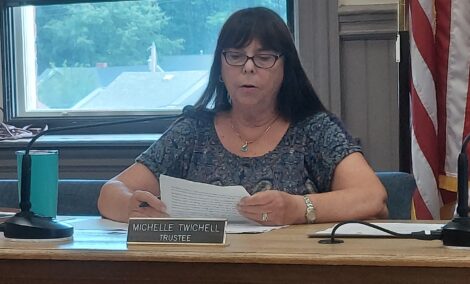Emergency propane tank filling bill passes

OBSERVER file photo Assemblyman Andrew Goodell, R-Jamestown, is pictured debating A.1451 on the Assembly floor.
The state is poised to allow homeowners leasing propane tanks to have another company fill those tanks during emergencies.
A.1451 passed 112-33 in the state Assembly, with both Assemblymen Andrew Goodell, R-Jamestown, and Joe Giglio, R-Gowanda, voting against. The bill has not come up for a vote yet in the Senate.
As written, the legislation would allow homeowners leasing liquefied petroleum gas containers to receive emergency deliveries from any suppliers during times of urgent need and periods of high demand when their regular suppliers could not fulfill the request.
“This bill simply allows people that have no alternative when they’re leasing their propane tanks, with nowhere to go and literally being left out in the cold,” said Assemblyman Angelo Santabarbara, D-Amsterdam.
“These are constituents of mine, but it has happened all over the state, people who have been met with long delivery times, sometimes going weeks without heating their homes, people that have had to leave their homes and go to a friend or a relative because they could no longer stay in their homes and they were either getting no response from their propane companies or a response with no definite time on when that fuel was going to arrive.”
The bill states that during a qualifying emergency, a customer running low on propane who reasonably believes their supply is insufficient to meet their heating needs may purchase propane from any temporary emergency supplier if the customer makes a good faith effort to purchase the propane from their regular supplier, but the regular supplier cannot or will not make a delivery and does not send a temporary supplier to make the delivery within 24 hours. All regular safety inspections and testing would need to be done before any refilling occurred.
Neither the regular or temporary emergency supplier may charge additional fees or penalties during qualifying emergencies that they don’t charge when qualifying emergencies are not in effect.
Goodell said those who heat with propane can avoid such circumstances by purchasing their tank rather than leasing the tank. Doing so can lessen a propane bill by as much as a third, he said. Many gas companies require those who lease tanks to sign a contract stipulating the person will only buy from the gas company supplying the tank.
“Before the state of New York starts rewriting contracts all across the state and disrupts an existing situation which has checks and balances already, I think we should respect contractual rights, respect the options that consumers have and don’t legalize a way for consumers to stick it to a company that is providing them with a tank by enabling them to buy propane at one-third off by not paying the lease payment,” Goodell said.
Goodell also took issue with the fact the legislation doesn’t require a disaster declaration from the state or local government and doesn’t define how a customer or gas company is to determine if a customer’s tank is low enough to qualify for the bill’s protections. Goodell was also critical that the bill doesn’t create a way to measure if past deliveries from a gas company have been delayed in order to trigger the legislation’s consumer protections.
“It’s just fundamentally unfair,” Goodell said. “Under current law you can decide to lease a tank and then you agree to buy the propane from that supplier. And if this was just in those situation when that supplier can’t supply I wouldn’t have a problem with it. Why? Because that’s assisting law. Under existing law if a supplier can’t give you natural gas you have a duty to mitigate damages, which means under existing law if they’re missing a delivery you can cover it. So where’s this different from existing law? It differs because it gives a blank check, if you will, for consumers using a subjective evaluation whether or not they might need gas, to call up their supplier and say get here within 24 hours. now imagine if the supplier asks, ‘How much propane is in that tank?’ ‘I’ve got a quarter of a tank.’ ‘That should last you two weeks.’ That doesn’t matter under this bill, not really, because it’s a subjective evaluation by the customer.”
After the bill becomes law, new contracts for supplying propane must include provisions related to the bill. The state Commissioner of Agriculture and Markets and the Attorney General will also develop a propane consumer bill of rights to explain the requirements of this law and the bill of rights would be provided to customers who sign contracts and would be posted on the Department of Agriculture and Markets website.
“They’re crucial and vulnerable residents — I’ve seen people with disabilities, families with little ones that have gone through this,” Santabarbara said. “This gives those families an opportunity to go to another supplier when their supplier can’t deliver. That’s what triggers this bill. When your supplier can’t deliver. And that is the key component of this bill. Your supplier can’t make it. Can I go somewhere else? This bill will spell out how you can do that, how the procedure works. It will be understood by customers and by propane companies. This makes the industry stronger, especially in some of these rural areas where this is their only source of heat. So to deny them the opportunity to find another supplier when temperatures drop low is something that we cannot do.”





